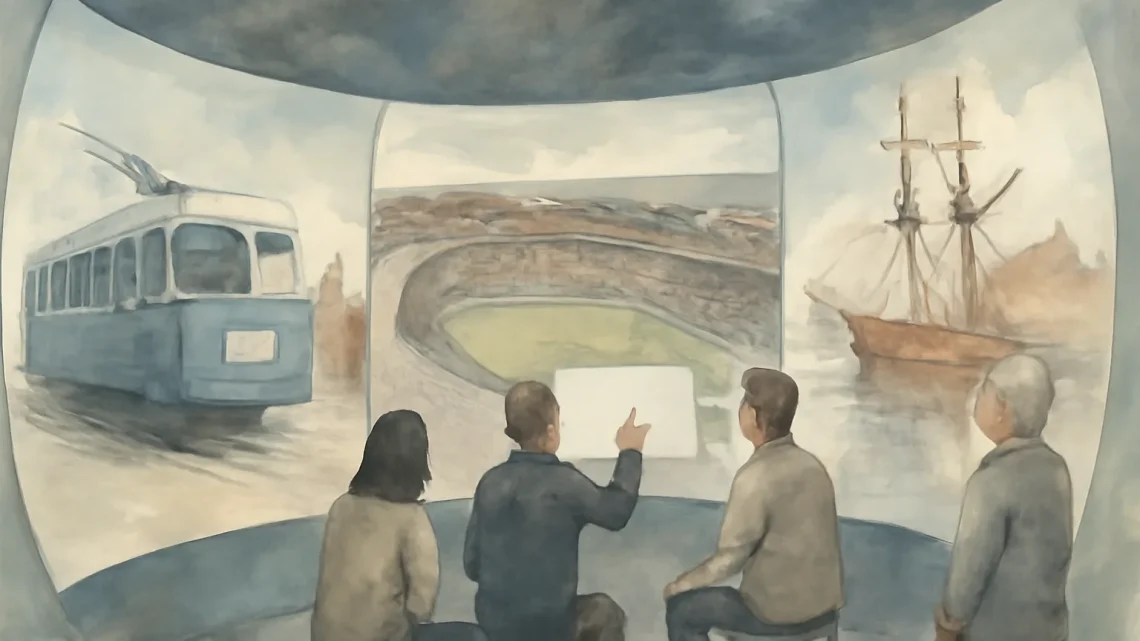
Immersive Project Supports Wellbeing of People with Dementia
November 5, 2025New initiative uses 360-degree technology to connect individuals with memories of Bradford
A project launched at the University of Bradford is using immersive technology to support the wellbeing of people living with dementia. The initiative, titled Back to Bradford: An Immersive Experience, invites participants to step inside the university’s iGloo, a seven-metre 360-degree immersive learning space, to view images and videos of Bradford’s landmarks and historical moments.
Immersive Experience Highlights Local Heritage
The presentation inside the iGloo features a rotating selection of photographs and videos depicting various Bradford district scenes from both past and present. These include:
- A blue Bradford trolleybus
- An aerial view of a rugby league match at Odsal Stadium in 1947
- The Shipley Glen Tramway
- The 1973 demolition of Bradford’s original Kirkgate Market
- A steam train arriving at Haworth Station
These images aim to stimulate memories and encourage participants to share their thoughts and feelings related to the visual content.
Participant Feedback and Project Goals
People with dementia took part in two sessions within the iGloo. One participant, Michael Andrews, who was diagnosed with Posterior Cortical Atrophy in 2017, shared that the images, including one of the Bradford riots, brought back personal memories. He described the project as beneficial for helping people with dementia recall past experiences and appreciated seeing older images of Bradford.
Reminiscence activities have been recognised for improving mood, social engagement, and overall wellbeing in people with dementia. However, the use of immersive technology for this purpose remains relatively unexplored.
Dr Ana Barbosa, Senior Research Fellow at the University’s Centre for Digital Innovations in Health and Social Care, leads the project team. They are collecting participant feedback using eye-tracking technology, audio recordings of discussions, and regular interviews to better understand the impact of the immersive experience.
Dr Barbosa explained that the project aims to trigger positive memories and improve mood, using immersive technology as a therapeutic tool not only for people with dementia but potentially for other vulnerable groups as well.
Connecting Memories Through Digital Innovation
Erica Bellamy, Director of Digital Health and Social Care at the University, highlighted the potential of immersive technologies to foster connections between people and their memories, communities, and each other. She noted that digital projection of familiar places can evoke moments of joy, reflection, and emotional connection.
Hasnehn Haider, the University’s Immersive Learning Lead, described the process of capturing real-world locations using specialist 360-degree cameras. He emphasised the significance of places such as Haworth, Saltaire, and central Bradford for many participants, and how combining past and present imagery adds depth to the experience.
About the iGloo Facility
The iGloo was among the first installations to offer 360-degree floor projection, creating a highly realistic immersive environment. Its development was supported by funding from the Arts & Humanities Research Council Capability for Collections Scheme (CapCo) and involved collaboration between the University’s Digital Health & Social Care and Archaeology & Forensic Sciences departments.
Professor Andrew Wilson, Chair in Forensic & Archaeological Sciences, noted that the iGloo serves as a visualisation tool for humanities research and engagement. He highlighted the value of cross-disciplinary collaboration, particularly in health, dementia, and social care research, utilising the immersive space.
Implications and Future Directions
This project reflects ongoing efforts to use digital technology to improve quality of life and support wellbeing among people living with dementia. By combining immersive learning with health research, the University of Bradford is exploring inclusive and impactful solutions to real-world challenges. The initiative also aligns with the University’s focus on community engagement and cultural heritage.




































